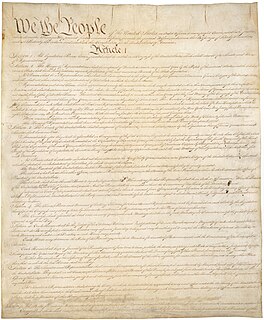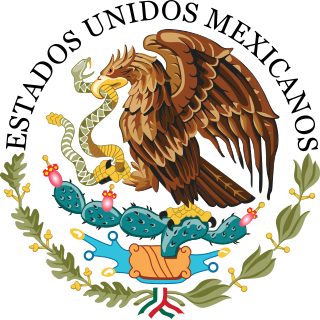Administrative law is the body of law that governs the activities of administrative agencies of government. Government agency action can include rule making, adjudication, or the enforcement of a specific regulatory agenda. Administrative law is considered a branch of public law.

Constitutional law is a body of law which defines the role, powers, and structure of different entities within a state, namely, the executive, the parliament or legislature, and the judiciary; as well as the basic rights of citizens and, in federal countries such as the United States and Canada, the relationship between the central government and state, provincial, or territorial governments.

Federalism is the mixed or compound mode of government, combining a general government with regional governments in a single political system. Its distinctive feature, exemplified in the founding example of modern federalism by the United States under the Constitution of 1787, is a relationship of parity between the two levels of government established. Federalism can thus be defined as a form of government in which there is a division of powers, between two levels of government of equal status.
Jurisdiction is the practical authority granted to a legal body to administer justice within a defined field of responsibility, e.g., Michigan tax law. In federations like the United States, areas of jurisdiction apply to local, state, and federal levels; e.g. the court has jurisdiction to apply federal law.

The Constitution of the United States is the supreme law of the United States of America. The Constitution, originally comprising seven articles, delineates the national frame of government. Its first three articles embody the doctrine of the separation of powers, whereby the federal government is divided into three branches: the legislative, consisting of the bicameral Congress ; the executive, consisting of the president ; and the judicial, consisting of the Supreme Court and other federal courts. Articles Four, Five and Six embody concepts of federalism, describing the rights and responsibilities of state governments, the states in relationship to the federal government, and the shared process of constitutional amendment. Article Seven establishes the procedure subsequently used by the thirteen States to ratify it. It is regarded as the oldest written and codified national constitution in force.

The United States Marshals Service (USMS) is a federal law enforcement agency within the U.S. Department of Justice. It is the oldest American federal law enforcement agency and was created by the Judiciary Act of 1789 during the presidency of George Washington as the Office of the United States Marshal. The USMS as it stands today was established in 1969 to provide guidance and assistance to Marshals throughout the federal judicial districts. USMS is an agency of the United States executive branch reporting to the United States Attorney General, but serves as the enforcement arm of the United States federal courts to ensure the effective operation of the judiciary and integrity of the Constitution.

A federation is a political entity characterized by a union of partially self-governing provinces, states, or other regions under a central federal government (federalism). In a federation, the self-governing status of the component states, as well as the division of power between them and the central government, is typically constitutionally entrenched and may not be altered by a unilateral decision of either party, the states or the federal political body. Alternatively, the federation is a form of government in which sovereign power is formally divided between a central authority and a number of constituent regions so that each region retains some degree of control over its internal affairs. It is often argued that federal states where the central government has the constitutional authority to suspend a constituent state's government by invoking gross mismanagement or civil unrest, or to adopt national legislation that overrides or infringe on the constituent states' powers by invoking the central government's constitutional authority to ensure "peace and good government" or to implement obligations contracted under an international treaty, are not truly federal states.

The federal government of the United States is the national government of the United States, a federal republic in North America, composed of 50 states, a federal district, five major self-governing territories and several island possessions. The federal government is composed of three distinct branches: legislative, executive and judicial, whose powers are vested by the U.S. Constitution in the Congress, the president and the federal courts, respectively. The powers and duties of these branches are further defined by acts of Congress, including the creation of executive departments and courts inferior to the Supreme Court.
A government or state agency, sometimes an appointed commission, is a permanent or semi-permanent organization in the machinery of government that is responsible for the oversight and administration of specific functions, such as an intelligence agency. There is a notable variety of agency types. Although usage differs, a government agency is normally distinct both from a department or ministry, and other types of public body established by government. The functions of an agency are normally executive in character, since different types of organizations are most often constituted in an advisory role—this distinction is often blurred in practice however.

The Necessary and Proper Clause, also known as the elastic clause, is a clause in Article I, Section 8 of the United States Constitution that is as follows:
The Congress shall have Power ... To make all Laws which shall be necessary and proper for carrying into Execution the foregoing Powers, and all other Powers vested by this Constitution in the Government of the United States, or in any Department or Officer thereof.
Redistricting is the process of drawing electoral district boundaries in the United States. A congressional act passed in 1967 requires that representatives be elected from single-member districts, except when a state has a single representative, in which case one state-wide at-large election be held.
Riparian water rights is a system for allocating water among those who possess land along its path. It has its origins in English common law. Riparian water rights exist in many jurisdictions with a common law heritage, such as Canada, Australia, and states in the eastern United States.
Concurrent powers are powers of a federal system of government shared by both the federal government and each constituent political unit. These powers may be exercised simultaneously within the same territory, in relation to the same body of citizens, and regarding the same subject-matter. Concurrent powers are contrasted with reserved powers and with exclusive federal powers.

The federal judiciary of the United States is one of the three branches of the federal government of the United States organized under the United States Constitution and laws of the federal government. Article III of the Constitution requires the establishment of a Supreme Court and permits the Congress to create other federal courts, and place limitations on their jurisdiction. Article III federal judges are appointed by the president with the consent of the Senate to serve until they resign, are impeached and convicted, retire, or die.

The Government of Malaysia officially the Federal Government of Malaysia is based in the Federal Territory of Putrajaya with the exception of the legislative branch, which is based in the national capital of Kuala Lumpur. Malaysia is a federation of 13 states operating within a constitutional monarchy under the Westminster parliamentary system and is categorised as a representative democracy. The federal government of Malaysia adheres to and is created by the Federal Constitution of Malaysia, the supreme law of the land.

In the United States, a state is a constituent political entity, of which there are currently 50. Bound together in a political union, each state holds governmental jurisdiction over a separate and defined geographic territory and shares its sovereignty with the federal government. Due to this shared sovereignty, Americans are citizens both of the federal republic and of the state in which they reside. State citizenship and residency are flexible, and no government approval is required to move between states, except for persons restricted by certain types of court orders.
Judicial review is a process under which executive or legislative actions are subject to review by the judiciary. A court with authority for judicial review may invalidate laws, acts and governmental actions that are incompatible with a higher authority: an executive decision may be invalidated for being unlawful or a statute may be invalidated for violating the terms of a constitution. Judicial review is one of the checks and balances in the separation of powers: the power of the judiciary to supervise the legislative and executive branches when the latter exceed their authority. The doctrine varies between jurisdictions, so the procedure and scope of judicial review may differ between and within countries.

The Federal government of Mexico is the national government of the United Mexican States, the central government established by its constitution to share sovereignty over the republic with the governments of the 31 individual Mexican states, and to represent such governments before international bodies such as the United Nations. The Mexican federal government has three branches: executive, legislative, and judicial and functions per the Constitution of the United Mexican States, as enacted in 1917, and as amended. The executive power is exercised by the executive branch, which is headed by the president and his Cabinet, which, together, are independent of the legislature. Legislative power is vested upon the Congress of the Union, a bicameral legislature comprising the Senate and the Chamber of Deputies. Judicial power is exercised by the judiciary, consisting of the Supreme Court of Justice of the Nation, the Council of the Federal Judiciary, and the collegiate, unitary, and district courts.
A law enforcement agency (LEA), in North American English, is any government agency responsible for the enforcement of the laws.








